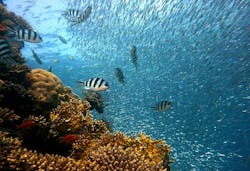Agricultural Runoff Damages Pacific Ocean Coral Reefs
A new study by researchers from Southern Cross University found that groundwater pollution containing excess nitrogen has contaminated South Pacific Ocean coral reefs at an increased rate during the second half of the 20th century. The nitrogen contamination has likely been caused by polluted agricultural runoff. The study, published in the journal Geophysical Research Letters, investigated coral reefs in the Cook Islands, located northeast of New Zealand, and studied the impact of nitrogen-laden groundwater on the reefs. Excess nitrogen contamination leads to algae growth, which limits the oxygen available in the water body that coral reefs need to thrive, as reported by Phys.org.
“It’s mainly about competition with algae,” said Lead Researcher Dirk Erler. “These fertilizers have the same effect on marine plants as terrestrial plants, so in effect you are just promoting algal proliferation.”
The research team analyzed nitrogen fingerprints preserved in long-lived coral skeletons by tracing the nitrogen signature. Using the nitrogen fingerprints, the team found nitrogen discharge in groundwater increased between 1960 and 2000, an agricultural boom period in the tested area. Even after the excess fertilizer use was curbed, excess nitrogen continued to leak into the coral reefs, which led the scientists to deduce the cause was groundwater after ruling out other sources.
“Our results show that unregulated nitrogen inputs to tropical islands eventually leads to the discharge of this nitrogen to surrounding reefs,” Erler said. “The important point is that the discharge can occur over many years after the cessation of the pollution.”
